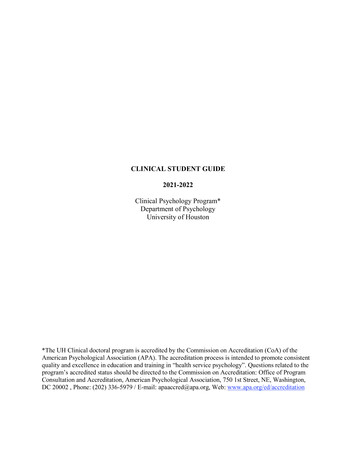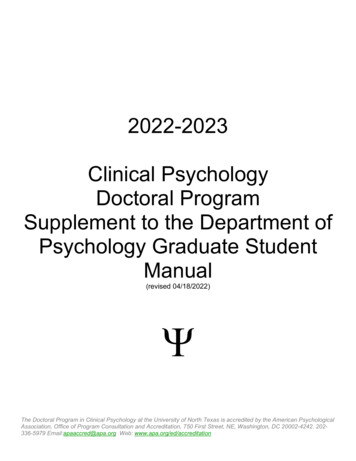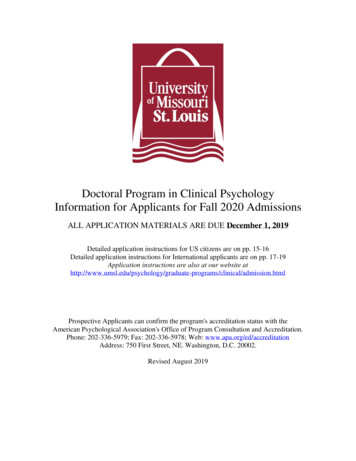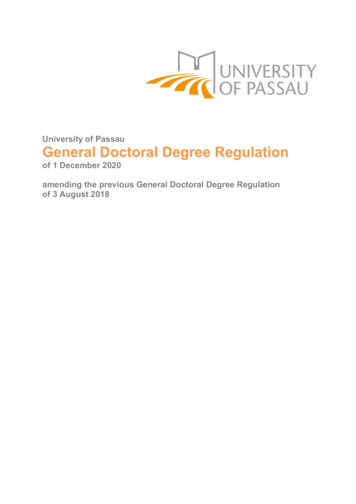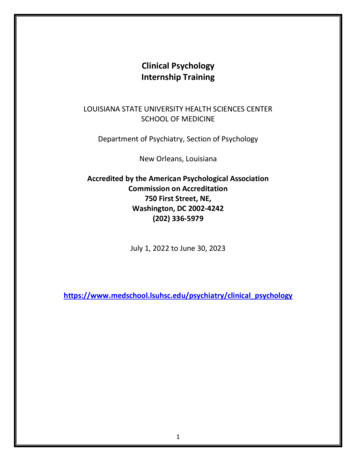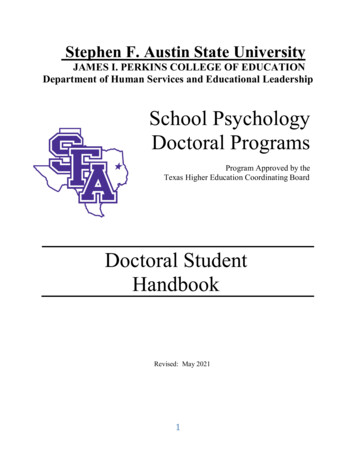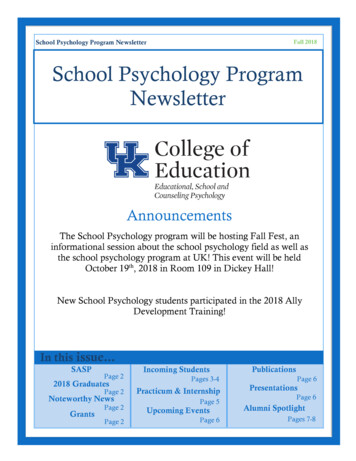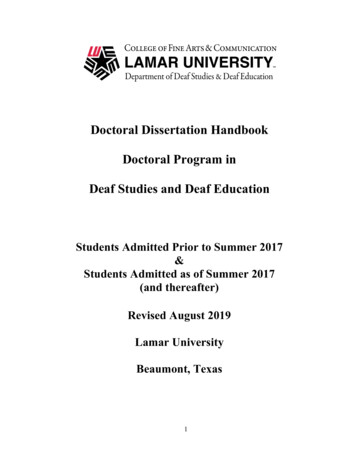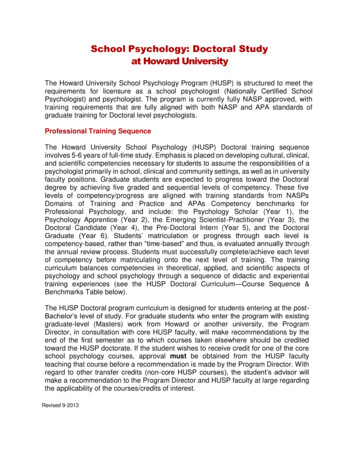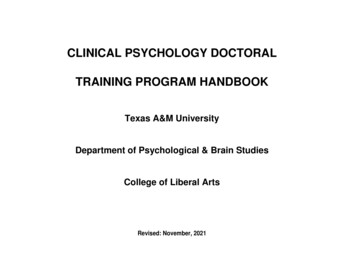
Transcription
CLINICAL PSYCHOLOGY DOCTORALTRAINING PROGRAM HANDBOOKTexas A&M UniversityDepartment of Psychological & Brain StudiesCollege of Liberal ArtsRevised: November, 2021
2Table of ContentsRequirements for the Doctoral Degree in Clinical Psychology . .4Overview . .6Program Curriculum .6Overview . .8Key Areas of Clinical Program Curriculum . .10Specific Coursework Required . .10Requirements by Texas A&M University . .10Requirements by Department of Psychological & Brain Sciences .10Requirements by the Clinical Psychology Doctoral Training Program . .12Requirements of the APA and/or State Licensing Boards . .15Doctoral Preliminary Examination .15Clinical Doctoral Training Program Typical Curriculum Sequence . 17Example of PSYC 614/613 Distributed Across Four Years . .18The Predoctoral Clinical Internship . 19Student Difficulties and Standards of Professional Conduct . .20General Comments . .20Leaves of Absence .20Unsatisfactory Progress .20Impaired Students Policy .21Compliance with Ethical Standards 21Involvement in Delivery of Clinical Services .21Grievance Procedures . .21Information for Students Who Have Completed a Master’s Degree at Another University .22Students Admitted with Prior Completion of a Research-Based MS Thesis . . . 22Students Admitted without Prior Completion of a Research-Based MS Thesis . .22Additional Graduate Student Issues . .23Transfer of Graduate Credits . .23Graduation . 24Grades .24
3Full-Time Status and Assistantships/Fellowships . .24Continuous Registration . .24Tuition and Required Fees Table .25Requirements for the Master of Science Degree .25Requirements for the Doctor of Philosophy Degree .26APPENDIX A: Department Leadership . 28APPENDIX B: Curriculum Worksheet . .39APPENDIX C: Preliminary Examination Questions Example . 40APPENDIX D: Links to Other Clinical Student Forms . . 41
4Information Regarding Requirements for theDoctoral Degree in Clinical PsychologyI.OverviewThe doctoral program in clinical psychology at Texas A&M University (TAMU) historically has adhered to a scientist-practitioner model oftraining. This model emphasizes that integrated skills in science and practice serve as the foundation for generating the knowledge baseand applications to practice that psychology requires to continue to develop and contribute to human welfare. Scientist-practitionerpsychologists embody a practice relevance in their research and a research orientation in their practice. Although adhering to the basictenets of the scientist-practitioner model, since the mid-2000s our training program has focused predominantly on recruiting studentswho have primary interests in research-oriented career paths and directing graduates of our program toward careers in academic orresearch settings rather than direct clinical service delivery. The majority of our graduates pursue research positions in academic ormedical settings, or clinical training or administrative positions in medical centers or community or governmental agencies. As such,following the conclusion of the American Psychological Association (APA) Commission on Accreditation (CoA) site visit in 2008, theclinical program adopted a modest revision to the description of our training model to more accurately reflect this emphasis. We nowdescribe the clinical program as a blend of the scientist-practitioner and clinical-scientist models, noting that our graduates acquire thefoundation for pursuing a strong clinical scientist career in an academic or research setting, as well as a robust scientist-practitionercareer in a medical or other training institution or serving in an administrative role in a service delivery agency.This Clinical Psychology Graduate Handbook provides a summary of curriculum requirements as they relate to the identified corefoundation in psychological science. The clinical training program at TAMU subscribes to the importance of broad training that preparesits graduates to work with diverse clinical phenomena and populations in diverse settings. Consequently, we have historically eschewedspecializations that restrict breadth of didactic or clinical experiences. At the same time, we recognize the importance of providing moreintensive, focused training experiences in specific domains and seek to retain sufficient flexibility to respond to both substantive areas ofcollective expertise reflected in our faculty and training/service needs of the discipline and consumer population. All our students areexpected to acquire understanding and competence in the conduct and interpretation of clinical research methods, as well asassessment and intervention of emotional and behavioral disorders.The clinical training curriculum reflects the program’s stance that each student should develop a program of coherent educational andtraining experiences tailored to his or her specific professional goals, in consultation with the research advisor, doctoral advisorycommittee and, where appropriate, the clinical program faculty. The clinical program strives to provide a structured series of experiencesthat help students achieve an integrated professional identity. The curriculum integrates methodology, the data base of psychology, andattention to individual clinical cases throughout. Each semester during the first through the fourth years involves course work, researchexperience under the guidance of a mentor, and clinical exposure.Every clinical doctoral student is required to complete the core clinical and department curricula to facilitate satisfaction of APAaccreditation guidelines and state licensure requirements. All students are expected to develop competence in both research andclinical skills in a manner consistent with the program’s training model. In addition, every student is expected to acquire competence inthe assessment and treatment of emotional and behavioral disorders across the lifespan, although the relative balance of emphasis onadult versus child or adolescent clients may vary. In rare cases, students may request limited exemptions from certain non-clinical
5courses based on graduate coursework at other institutions after consultation with their major advisor, the Director of Training, theinstructor of the required course in this department, and the Director of Graduate Studies.Students are responsible for matching their degree plans with APA accreditation, university, departmental, and clinical programrequirements, as well as with their career plans and plans for licensure as a psychologist. Please be advised that, according to theAssociation of State and Provincial Psychology Boards (ASPPB), if a substantive content area for a given student’s degree transcript iscovered in more than a single 3-credit hour course or in a course with a title that is not indicative of that content, supporting documents(e.g., a course syllabus, University course catalog, official course numbers and titles), may be required for licensure or other credentials.Requirements regarding the thesis and dissertation research, doctoral preliminary examination, dissertation defense,predoctoral internship, and other university policies and procedures are also articulated in this handbook.
6II. Program CurriculumIIa. OverviewStudents must confirm directly with the Graduate and Professional School (GPS) and the Department of Psychological & BrainStudies Associate Head of Graduate Studies, and the Clinical Program Director of Clinical Training (DCT) regarding registrationrequirements unique to their own situation that may differ from what is described here.Students are strongly encouraged to regularly consult with the Graduate and Professional School https://grad.tamu.edu/, the Department ofPsychological & Brain Studies Associate Head of Graduate Studies, and the Clinical Program Director of Clinical Training to ensure thatUniversity, Departmental, and Program requirements and deadlines are complied with, so as to promote timely progress toward completion ofdegree requirements.Clinical Psychology Doctoral Training Program structure and curriculum flow from a blend of the clinical-scientist model and the scientistpractitioner model. Specifically the clinical program strives to fully integrate the range of research, teaching, and applied skills in training doctoralstudents. This approach views research and applied skills as interwoven rather than as two discrete sets of skills. As a result, successful graduatesshould have the options of a strong clinical scientist career, such as joining the faculty of a major research university or being a researcher for agovernment agency, as well as a robust scientist-practitioner career, such as joining the faculty of a medical school or teaching institution orserving in an administrative role in a service delivery agency.APA Accreditation Requirements. The following narrative is adopted from the University of North Carolina (UNC-Chapel Hill) Clinical PsychologyGraduate Program Handbook dbook, which provides a careful and thorough discussion of theserequirements.The American Psychological Association (APA) stipulates that students in accredited clinical programs should demonstrate competence in:1. Profession-wide competencies (PWC), including: a) research, b) ethical and legal standards, c) individual and cultural diversity, d)professional values, attitudes, and behaviors, e) communication and interpersonal skills, f) assessment, g) intervention, h) supervision, and i)consultation and interprofessional/interdisciplinary skills.2. Discipline-specific knowledge (DSK), including: a) affective aspects of behavior, b) biological aspects of behavior, c) cognitive aspects ofbehavior, d) developmental aspects of behavior, e) social aspects of behavior, f) history and systems of psychology, g) research methods, h)statistical analysis, and i) psychometrics.Students must also demonstrate advanced integrative knowledge of at least 2 of the discipline specific areas listed above in a-e. This istypically done via a graduate-level course that serves as “an evaluated educational experience that provides basic coverage in two or more areasand integration across those areas.” These areas of competence and knowledge may be demonstrated through students’ participation incoursework (full courses or parts of courses), independent study, research experiences, or clinical practica. For the DSK areas (and for “advancedintegrative knowledge”), APA requires that knowledge be demonstrated via an “evaluated educational experience” (EEE), defined as “a learningexperience (e.g., course, parts of courses, or independent study) the outcome of which is assessed by a person recognized as having currentknowledge and expertise in the area of the learning experience.”Students often have questions regarding courses that fulfill the DSK requirements listed above. The purpose of this requirement, as specified byAPA in the Standards of Accreditation, is to ensure that students “acquire a general knowledge base in the field of psychology, broadly construed,to serve as a foundation for further training in the practice of health service psychology.”
7Foundational knowledge is required for DSK areas a-f above and may be acquired prior to beginning the doctoral program. For example, thefoundational requirement could be met by successful completion (B-/80% or higher) of an undergraduate course at a 4-year accredited institutionin the relevant topic (e.g., undergraduate course in cognitive psychology). For an undergraduate course that you think may satisfy foundationalknowledge but are not sure, please provide the DCT with the course syllabus and the transcript that documents course completion andgrade; this will be reviewed with the Clinical Curriculum Committee. For DSK areas where a student has not acquired foundationalknowledge prior to matriculation in our program, this can be obtained at the undergraduate or through graduate-level training via a graduatecourse. For the latter, the expectation is that the graduate course includes foundational readings relevant to that course topic and that theevaluation of your work in the course assumes mastery of this foundational knowledge. If you are uncertain as to whether a graduate course willprovide foundational knowledge, please consult with the DCT.Graduate-level knowledge is required for areas a-e and g-i; this is most commonly achieved via graduate-level courses in our Department.There are some courses that will satisfy foundational and graduate-level knowledge for 2 areas at once, as well as provide integration of theseareas, and thus could meet both the DSK requirements and the “advanced integrative knowledge” requirement.The sole DSK requirement that only needs to be met at the foundational level is history and systems of psychology. Students meet thisrequirement by having taken a course on this topic as an undergraduate at a 4-year accredited institution (grade of B-/80% or higher). History andsystems is also infused throughout our graduate courses, which can satisfy the requirement.To help you select courses in the program, a worksheet has been developed with each of these requirements listed (see Appendix B).NOTE: Following graduation, you may wish to earn a license to practice clinical psychology in one or more North American states or provinces.The licensure application (for some states in particular) similarly will require you to demonstrate competence in the areas above; in most cases,obtaining a doctoral degree from an APA-accredited doctoral program suffices. However, licensure applications in some states sometimes requirecourses, while other states are more flexible in the procedures used to help you obtain a sufficient level of competence. You can find links toevery state and province psychology licensing board at https://www.asppb.net/, and the licensure applications and requirements for moststates/provinces are available online.IIb. Key Areas of Clinical Program CurriculumIssues of Professional Ethics, Diversity/Culture, and History and Systems are infused into each clinical core course and clinical elective course.These issues are clearly described in each course listing and in each course syllabus. Certainly, these three topics are germane to the entire field ofclinical psychology and are integral to both the academic and applied aspects of doctoral training.Each graduate student entering the program is required to join one or more faculty-led research teams during their first year in the program. Bydoing so, students receive the opportunity to collaborate with team members in developing research questions, designing empirical studies,collecting and analyzing data, writing manuscripts and presenting results at national and regional conferences. Students also are required tocomplete a number of research, measurement, and statistics courses by the completion of their second year of study, so that they have theknowledge and skills to participate meaningfully in research activities. As early as prior to the start of the first Fall semester and no later than theend of the first Fall semester, students must identify a department faculty member who will serve as their graduate faculty advisor and master’sthesis committee chair.
8Fall incoming students in the Department are required to begin work on a First Year Research Project very early in their first semester. The resultsof that work will be presented the following September at a department-wide research colloquium. The goal of this requirement is for students tobegin building research and publication skills as quickly as possible. Thus, for many students, this will be a project largely designed by the graduatefaculty advisor, as part of his/her research program. This will ordinarily be a project that can be published if it is successful and the student’sinvolvement would merit authorship. This project would not be identical to the master’s thesis, because the goal is to produce additional researchand additional publications.Attendance in the Fall and Spring semesters is required at the bi-weekly Clinical Research Seminar by all students until they leave campus fortheir full-time professional internship. Original research, research proposals, grant proposals, and research/grant issue topics are presented byclinical faculty and students in this bi-weekly seminar. In addition, speakers from the department, university, and region regularly make researchpresentations. At least once per year a speaker of national prominence presents her/his research. Issues presented may include research design,degree plan development, research ethics, the IRB process, preparation for thesis/dissertation proposals/defenses, grantsmanship, “telling yourprofessional story,” clinical internship and post-doctoral fellowship training, and other relevant topics are covered via discussion, readings, andpresentations.By the end of the Fall semester of their second year in the program, students are strongly encouraged to develop one or two OPTIONAL specialtyemphases for their training. This decision is made in careful consultation with the student’s faculty advisor and advisory committee. Specificcredits to support training in specialty emphases typically is not begun until after the Spring semester of the second year. Once declared, specialtyemphases made be changed, deleted, or added, but only after careful consultation with a student’s faculty advisor and other faculty members.Special emphasis training may be acquired through courses, focused research, and focused practica experiences, as approved by the student’sfaculty advisor and advisory committee. At present, the following are special emphases that have the faculty, coursework and other trainingexperiences to support a student’s specialized training. Additional special emphasis areas must be approved by the clinical faculty.Behavior TherapyCouples/Family PsychologyGender IssuesOCD-spectrum DisordersPsychological AssessmentClinical Child and Adolescent PsychologyDiversity/Cultural IssuesGeropsychologyPersonality/ Interpersonal ProcessesQuantitative MethodsClinical NeuroscienceForensic PsychologyHealth PsychologyPrevention Science
9Practicum (PSYC 614 and PSYC 613) includes a bi-weekly Clinical Practicum Seminar designed to integrate research, coursework, and appliedtraining and weekly supervisory instruction from a faculty supervisor. First year students, any student who is seeing clients (PSYC 614 and/or PSYC613), and faculty currently supervising in the Clinic are required to attend this seminar every other Wednesday in Fall and Spring semesters. PSYC614/613 instructors typically are assigned a group of 3-7 trainees by the Director of Clinical Training and Associate Director of Clinical Training, inconsultation with the clinical faculty, Department Head and Associate Head, and based on input from graduate students.Students are required to complete 12 credits of PSYC 614 (Clinical Interventions Practicum) and/or PSYC 613 (Clinical AssessmentPracticum) on their degree plan before leaving for internship. Typically, 1 credit of PSYC 614 is taken each semester starting the Fall semester of astudent’s second year in the program. Typically, PSYC 613 credits are started the Summer semester of a student’s second year in the program,after completing Assessment 2 (PSYC 624). It is acceptable for a student to take only PSYC 613 credit and no PSYC 614 credit in a given semesterif training includes only Assessment Practicum and no therapy/interventions cases are active on a student’s caseload (and vice versa). At least 5 ofthe 12 required credits must include both PSYC 614 and PSYC 613 (e.g., 7 credits PSYC 614 and 5 credits PSYC 613; or 5 credits PSYC 614 and7 credits PSYC 613; or any combination summing to 12 credits total between both, with minimum 5 credits in either).The Clinic caseload expectation for a student taking 1 credit of PSYC 614 is 5 active cases at any given time. The actual contact hours withclients on a student’s caseload and other information from Interventions Practicum Supervisors is used to adjust up or down the actual number ofactive cases a given student is expected to manage. Clinic caseload expectations for students in Assessment Practicum (PSYC 613) is determinedby the Assessment Practicum Supervisor, but often is 2 to 4 active evaluation cases at any given time. When a student has completed the 12credits of PSYC 614 and/or PSYC 613 required on his/her degree plan, she/he may opt to continue with practicum training. Under thesecircumstances, if a student opts to continue to receive PSYC 614 training, he/she may request a change in caseload expectation to less than 5active cases. This request must be in writing to the Clinic Director and a written endorsement of the request must be received by the student’scurrent Clinic Supervisor and Research Supervisor. Written email requests are acceptable. Alterations in caseload expectations for PSYC 613 aremuch less likely due to the time-demand nature of this training experience. Of course, students before or after completion of the required 12 creditsof PSYC 614 or PSYC 613 may request to be assigned more than the typical caseload expectations, if such a request is supported by the currentClinic Supervisors and Research Advisor as being conducive to the training goals of that student.Summary of Clinical Program Coursework RequirementsCourse TypeStatistics and Research DesignPsychopathologyPsychological AssessmentClinical InterventionsPracticum (includes Clinical Interventions Practicum & Psychological Assessment Practicum)Research (includes Research, Clinical Research Seminar, & Directed Studies)ElectivesProfessional Internship (typically NOT on degree plan)TOTALRequired Credits63691224241 credit per Fall andSpring semester96Students should inquire withthe Office of Graduate andProfessional Studiesabout State regulations thatthe University collectnonresident tuition from alldoctoral students who enroll in100 or more semester creditsof doctoral course work.
10IIc. Specific Coursework Required for the Doctoral Degree in Clinical PsychologyNote: All required clinical and departmental credits must be passed with a grade of A or B.IIci. Requirements by Texas A&M University:Total creditsA minimum of 32 semester credits of approved courses and research are required for the master of science degree.A minimum of 96 credits beyond the baccalaureate degree or 64 credits beyond the master’s degree are required for the doctoral degree.A minimum of 64 credits at Texas A&M are required of students who are admitted with a master’s degree from another university.(Completion of clinical program requirements for such students would typically exceed this university requirement.)In sections B and C that follow, 75 credits in specific courses (including research credits) are required for clinical doctoral students (master ofscience degree and doctoral degree credits combined). An additional 21 credits must be taken from elective courses determined by thestudent in conjunction with his/her advisory committee.IIcii. Requirements by the Department of Psychology:Statistics and Research Design (6 credits required)PSYC 607PSYC 671Experimental PsychologyExperimental Design for Behavioral Scientists3 credits3 creditsThe clinical program encourages students to complete at least two additional Statistics and Research Design courses that may be chosen,in conjunction with a student’s advisory committee, based on students’ training needs. A sample of such courses includes:EPSY 625EPSY 642EPSY 643EPSY 651EPSY 652EPSY 653EPSY 654Advanced Behavioral MeasurementMeta-Analysis of Behavioral ResearchApplied Multivariate MethodsTheory of Structural Equation ModelingTheory of Hierarchical Linear ModelsAdvanced Structural Equation ModelingLongitudinal Data Analysis3 credits3 credits3 credits3 credits3 credits3 credits3 credits
11Other statistics/methodology courses may be chosen as electives, as determined by the student in conjunction with his/her advisorycommittee. Consideration may be given to earning a Graduate Certificate in Education & Social Sciences Advanced Research Methods,which is extended to clinical PSYC graduate students by CEHD.Students may request substitution of related courses (such as PSYC 689 Special Topics in ) for the courses listed above in somecircumstances. Such petitions should be initiated through the student’s graduate faculty advisor and must be approved by the Director ofClinical Training in consultation with the Director of Graduate Studies and the program area for which the substitution is being requested.Students should be advised, however, that Implementing Regulation C-16 of the APA CoA indicates that training in core areas of sciencemust be “broad and general” rather than overly specialized or applied. For example, coursework in neuropsychological assessment andpsychopharmacology can be included in the category of biological bases of behavior, but they do not by themselves fulfill trainingrequirements in this category.
12IIciii. Requirements by the Clinical Psychology Doctoral Training Program:Psychopathology (3 credits required)1. The following is required:PSYC 626Psychopathology3 credits2. The following is a sample of elective courses that may be chosen based on students’ training needs:Assessment and Psychometrics (6 credits required)1. The following are required:PSYC 623PSYC 624Assessment 1—Psychometrics & Personality AssessmentAssessment 2—Intellectual & Cognitive Assessment3 credits3 credits2. The following us a sample of elective courses that may be chosen based on students’ training needs:PSYC 627EPSY 621EPSY 628SPSY 615SPSY 617SPSY 642SPSY 657Psychological Assessment of Children & AdolescentsClinical NeuropsychologyRorschach Technique with Children and AdolescentsIndividual Assessment of Preschool ChildrenDiagnosis of Emotionally Disturbed ChildrenBehavioral Assessment and InterventionBilingual Psychoeducational Assessment3 credits3 credits3 credits3 credits3 credits3 credits3 creditsClinical Interventions (9 credits required)1. The following are required:PSYC 608PSYC 637PSYC 638Introduction to Clinical Ethics & TechniquesClinical Interventions 1Clinical Interventions 23 credits3 credits3 credits
132. The following is a sample of elective courses that may be chosen based on students’ training needs:PSYC 616PSYC 630PSYC 639PSYC 678PSYC 689SPSY 628SPSY 641SPSY 642Treatment of Problem Behavior in Children and FamiliesHealth Psychology and Behavioral MedicinePediatric PsychologyCouples TherapySpecial Topics in Clinical PsychologyConsultation Theory and TechniquesChild Therapy for School Behavior ProblemsBehavioral Assessment and Intervention3 credits3 credits3 credits3 credits3 credits3 credits3 credits3 creditsAdditional clinical intervention elective courses may be available in the Department of Educational Psychology.Practicum (12 credits required)1. The following are required:PSYC 613/614 Practicum in Clinical PsychologyAt least 5 credits of Psychological Assessment Practicum (PSYC 613)At least 5 credits of Clinical Interventions Practicum (PSYC 614)12 credits2. Students may request additional practicum through the Counseling and Assessment Clinic (Department of Educational Psychology), thecampus Student Counseling Services, or off campus sites. Such petitions should be initiated through the student’s graduate advisor andmust be approved by the Director of Clinical Training.Research (24 credits required)1.The following are required:PSYC 691Research (or PSYC 685 Directed Studies)24 credits2. The following may be substituted for some of the required 24 credits of PSYC 691 or PSYC 685.PSYC 677Clinical Research Seminar1-2 credits3. The Graduate Catalog states that the degree plan for the doctoral degree must carry “ a reasonable amount of 691 (Research)”. TheGraduate Catalog also states that the degree plan for the master of science degree may include “a maximum of 8 credits of 691 (Research),or 485 and/or 685 (Directed Studies), and up to 3 credits of 690 (Theory of Research) or 695 (Frontiers in Research)—no more than 12credits of any combination of these.”
14Elective Courses (24 credits required)The following is a sample of other elective courses— other examples have already been listed in other course categories —that may bechosen, in conjunction with a stu
University, Departmental, and Program requirements and deadlines are complied with, so as to promote timely progress toward completion of degree requirements. Clinical Psychology Doctoral Training Program structure and curriculum flow from a blend of the clinical-scientist model and the scientist- practitioner model. Specifically the clinical .
